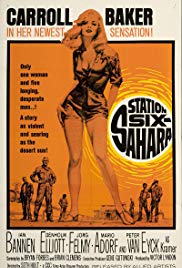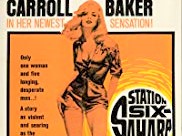Station Six-Sahara *** (1963, Carroll Baker, Peter van Eyck, Ian Bannen, Denholm Elliott) – Classic Movie Review 7256
‘One Woman Alone With Five Lusty Men’. Director Seth Holt’s torrid 1963 romantic adventure drama Station Six-Sahara stars Carroll Baker in her regular role at the time of a gorgeous, blonde young nymphet called Catherine, whose chance arrival at an isolated Sahara Desert oil well station throws the male oil workers into a state of total frenzied confusion.
Station Six-Sahara is an enjoyably lurid and melodramatic cocktail of sun, sea, sweat and sleaze. It tingles with tension, and is lifted with several other redeeming features, including Gerald Gibbs’s Bafta Film Awards nominated Best British Cinematography (Black and White) and good acting work as usual from the strangely out-of-place Ian Bannen and Denholm Elliott, as Fletcher and Macey, as well as from Peter van Eyck, Mario Adorf, Jorg Felmy [Hansjörg Felmy] Biff McGuire and Harry Baird.
Station Six-Sahara is an unusual erotic outpouring from the fertile pen of Bryan Forbes, co-scripting with Avengers man Brian Clemens, basing their screenplay on Jean Martet’s play Men without a Past. It is a remake of a 1938 German film S O S Sahara with Charles Vanel, Jean-Pierre Aumont and Marta Labarr. Its play base is noticeable in the tiny cast, but no matter. In the end it all comes down to the script, with its characters and its dialogue, and that is not at all bad.
Station Six-Sahara (Endstation 13 Sahara) is directed by Seth Holt, runs 102 minutes, is made by CCC-Filmkunst and British Lion, is released by British Lion and Allied Artists, is written by Bryan Forbes and Brian Clemens, based on Jean Martet’s play Men without a Past, is shot in black and white by Gerald Gibbs, is produced by Artur Brauner, Gene Gutowski and Victor Lyndon, is scored by Ron Grainer and designed by Jack Stephens.
It was filmed in the studio at Shepperton Studios, Surrey, England, and on location in the Sahara Desert, Libya.
Station Six-Sahara is a 1962 British-West German international co-production, part of an ambitious plan by the German production company CCC Films to make films in London, which ended after only two films.
It has its fans: Dilys Powell called it ‘true cinema’ and it is greatly admired by Martin Scorsese.
Elliott said the film transformed his career.
Hansjörg Felmy (1931–2007) was the son of senior Luftwaffe general Hellmuth Felmy.
© Derek Winnert 2018 Classic Movie Review 7256
Check out more reviews on http://derekwinnert.com



